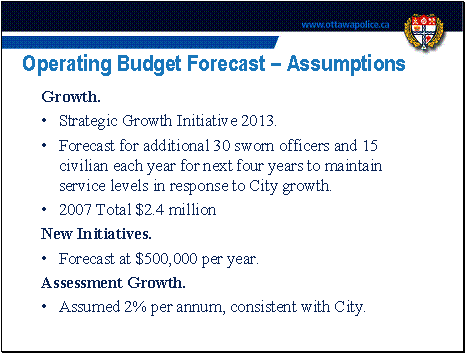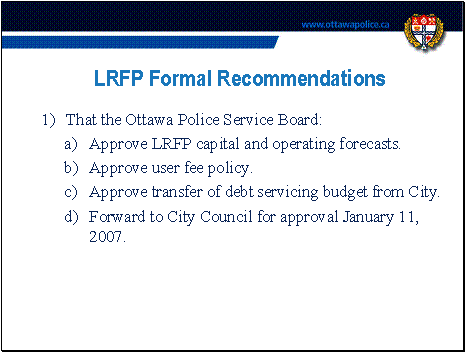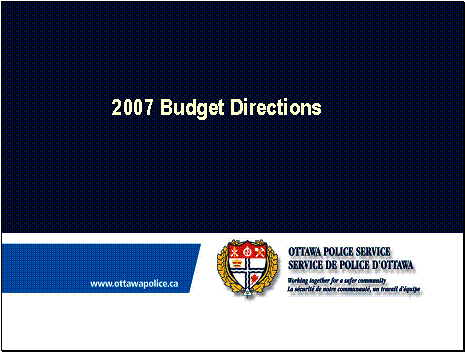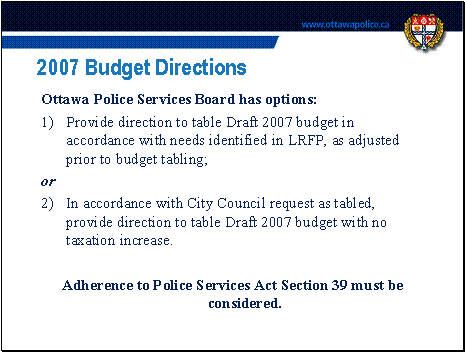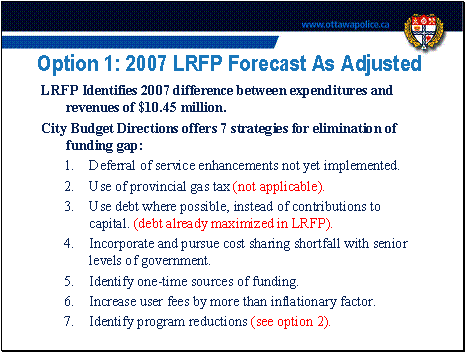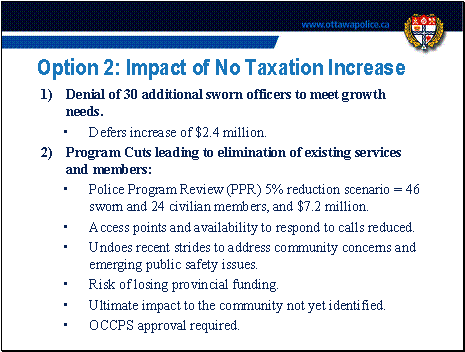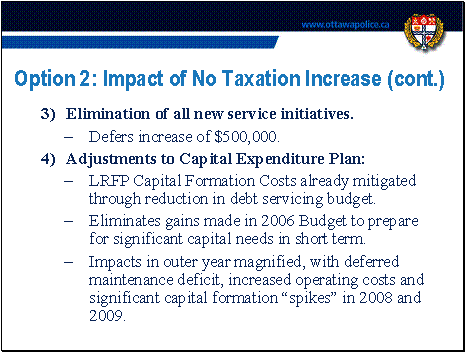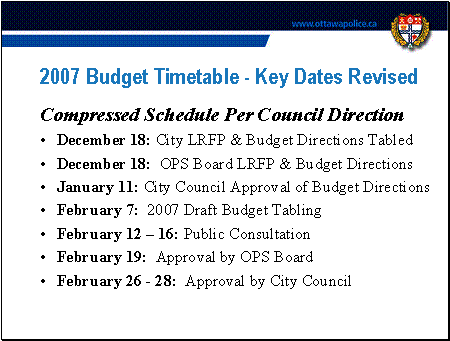|
1.
OPS LONG RANGE FINANCIAL PLAN AND 2007 BUDGET DIRECTIONS
PLAN FINANCIER À LONG TERME DU SERVICE DE POLICE
D’OTTAWA ET 2007 DIRECTIVES BUDGÉTAIRES
|
BOARD RECOMMENDATION
That Council approve the following steps to action the OPS Long
Range Financial Plan:
a.
Approve
the forecast Ottawa Police Service four-year operating expenditure requirements
and ten-year capital needs as detailed in Attachments 1 and 2.
b.
Approve
a user fee policy that maintains the proportion of tax rate support and revenue
from the benefiting user for all fees not otherwise governed by by-law or
previously approved Board objective.
c.
Approve
the 2007 transfer of Ottawa Police Services debt servicing budget of $5.258
million from the City of Ottawa to the OPS budget.
RECOMMANDATION DE LA
COMMISSION
Que le Conseil, en vue de la
mise en œuvre du Plan financier à long terme du Service de police d'Ottawa
(SPO) :
a.
approuve
les prévisions des dépenses de fonctionnement sur quatre ans et des besoins en immobilisations
sur dix ans du SPO, telles qu'elles sont décrites en détail dans les annexes 1
et 2;
b.
approuve une politique de frais d'utilisation qui
maintiendrait le rapport actuel entre le financement tiré des rentrées fiscales
et les recettes provenant des utilisateurs bénéficiaires pour tous les frais
non visés par un règlement municipal ou par une politique précédemment
approuvée par la Commission;
c.
approuve le transfert, du budget de la Ville d'Ottawa
au budget du SPO, d'un montant de 5,258 millions de dollars au titre du service
de la dette du SPO pour 2007.
DOCUMENTATION
1. Director of Finance &
Materiel Management’s report dated 15 December 2006 is attached.
2. Presentation
attached at Annex A.
3. Extract of Draft Minute, 18 December 2006 is
attached.
|

|
REPORT
RAPPORT
|
|
DATE:
|
15 December 2006
|
|
TO:
|
Executive Director, Ottawa Police
Services Board
|
|
FROM:
|
Director of Finance and Materiel
Management, Ottawa Police Service
|
|
SUBJECT:
|
OPS
LONG RANGE FINANCIAL PLAN AND 2007 BUDGET DIRECTIONS
|

RECOMMENDATIONS
1.
That
the Ottawa Police Services Board take the following steps to action the OPS
Long Range Financial Plan:
a.
Approve the forecast Ottawa Police Service
four-year operating expenditure requirements and ten-year capital needs as
detailed in Attachments 1 and 2.
b.
Approve
a user fee policy that maintains the proportion of tax rate support and revenue
from the benefiting user for all fees not otherwise governed by by-law or
previously approved Board objective.
c.
Approve
the 2007 transfer of Ottawa Police Services debt servicing budget of $5.258
million from the City of Ottawa to the OPS budget.
d.
Forward
the OPS Long Range Financial Plan to City Council for approval at the 11
January 2007 Council meeting.
2.
That the Ottawa Police
Services Board approve a 2007 Budget Direction which will result in either:
a.
A $10.45 million increase in taxation in
accordance with the Long Range Financial Plan, subject to adjustments
identified prior to tabling of the budget; or
b.
No
increase in taxation.
BACKGROUND
The Ottawa Police Service Long Range Financial Plan sets the
framework and policies for future annual budget processes, and confirms
management and the Board’s commitment to financial planning and financial
sustainability for the Ottawa Police.
It provides a framework for setting the expenditure priorities of the
Board, and a long term funding strategy for those identified needs.
In October 2002,
City Council approved the newly amalgamated City of Ottawa’s first Long Range
Financial Plan (LRFP). That report provided
policy recommendations to address the City’s current and future capital
expenditure requirements. In 2004, that
plan was refreshed for the City as a whole, and the Ottawa Police Services
Board approved a police specific LRFP that was submitted for inclusion with the
City’s plan. The 2004 Police LRFP
included an endorsement of the City’s debt financing policy and a plan to grow
the OPS pay-as-you-go capital contributions program to fully fund lifecycle
capital costs.
In July 2006,
City Council approved an Integrated Planning Framework. This framework sets the schedule for
integration of the City’s master planning processes. The Long Range Financial Plan is to be refreshed at the beginning
of each new term of City Council. This
report constitutes the OPS submission for approval by the Board, and
consolidation into the City report.
Previous
versions of the LRFP focussed entirely on the long term capital needs of the
police service, and the City as a whole.
This update will also provide a multi-year operating expenditure needs
forecast, and the associated funding requirements. The inclusion of multi year operating budget requirements is in
response to a recommendation from the City’s Auditor General’s 2005 Audit of
the OPS Budget Development Process, and is consistent with the City’s Integrated
Planning Framework.
With the
inclusion of operating budget requirements, the LRFP is a comprehensive
analysis of the high level forecast expenditure needs and associated funding
strategies that will impact the guidelines for each annual budget process in
the current term of the Police Services Board and City Council. The LRFP will also link to all future OPS
Business Plans and other strategic planning documents.
On 25 July 2006,
the OPS Board approved the 2007 Long Range Financial Plan and Budget Process
report. Since that time, scheduling
of the review and approval of the OPS Long Range Financial Plan has been
significantly delayed and revised to follow changes implemented by the City as
a whole. Part 1 of the City’s Long
Range Financial Plan III was presented to City Council on 11 October 2006. City Staff have now tabled part 2 of that
report, and public consultation is currently in progress.
City Council has also tabled the 2007 Budget Directions report.
Within that report was a recommendation that the Ottawa Police Service table a
Draft 2007 Operating Budget consistent with the citywide direction of no
increase in taxation. This report will
also provide the potential impacts of that direction to the Ottawa Police
Service.
City Council is
scheduled to approve all elements of the LRFP, as well as the 2007 Budget
Directions on 11 January 2007.
The Board now has two tasks to complete in order to meet
the accelerated budget schedule timelines:
DISCUSSION
Ottawa Police
Services Finances in Context
For every
Canadian municipality that provides police service, the cost of providing that
service constitutes one of the biggest financial commitments in the annual
budget and resulting tax rate. For
2006, Ottawa Police services represent 16% of the total city property tax bill,
excluding education, or $404 for an average residence with an assessed value of
$276,000. On a cost per service basis,
only the cost of transit service is greater than the cost of policing in the
City of Ottawa.
As with all
municipal costs, the Ottawa Police Service gross budget has increased in recent
years. Increases have been primarily
attributable to the Strategic Staffing Initiative (SSI) and contractual
personnel costs. Gross annual budget
increases since City amalgamation in 2001 are presented in Table 1.
Table 1: Ottawa Police Service Gross Operating Budget
2001 to 2006
|
|
2001
|
2002
|
2003
|
2004
|
2005
|
2006
|
|
|
$000
|
$000
|
$000
|
$000
|
$000
|
$000
|
|
OPS Operating Budget - Total Gross Expenditures *
|
128,761
|
137,130
|
144,279
|
158,427
|
174,670
|
189,167
|
|
% Annual Increase
|
|
6.5%
|
5.2%
|
9.8%
|
10.3%
|
8.3%
|
|
|
|
|
|
|
|
|
As presented in Table 2, while gross spending has increased
over this period, the increases have for the most part been proportional with
the total City budget. The proportional
police share of total City budget has increased slightly since 2003, from 7.8%
to 9.0%.
Table 2: OPS Gross Budget in Proportion to Total City
Budget
|
Gross Operating Budget
|
2001
|
2002
|
2003
|
2004
|
2005
|
2006
|
|
|
$000
|
$000
|
$000
|
$000
|
$000
|
$000
|
|
City Operating Budget
|
1,681,519
|
1,726,046
|
1,838,862
|
1,898,290
|
1,988,385
|
2,113,224
|
|
OPS Operating Budget *
|
128,761
|
137,130
|
144,279
|
158,427
|
174,670
|
189,167
|
|
OPS as % of Total City
|
7.7%
|
7.9%
|
7.8%
|
8.3%
|
8.8%
|
9.0%
|
* Gross excluding Non
Departmental expenditures resident with the City of Ottawa
Even with the proportionately greater
increases in recent years, the OPS compares favourably to other municipalities
in Ontario. For example, in Toronto,
10.0%
of gross municipal spending supports police services.
On a per capita basis, police costs in
Ottawa fall in the middle of the pack for twelve Canadian municipalities most
recently analyzed and published by Statistics Canada in November 2006.
Table 3: Police Costs Per Capita
|
|
2005
|
StatsCan
|
Cost per
|
|
|
Service
|
Costs
|
Population
|
Capita
|
Rank
|
|
Toronto
|
$ 794,388,904
|
2,607,637
|
$305
|
1
|
|
Vancouver
|
$ 176,042,279
|
584,701
|
$301
|
2
|
|
Edmonton
|
$ 192,725,300
|
718,788
|
$268
|
3
|
|
Montreal
|
$ 472,709,169
|
1,873,813
|
$252
|
4
|
|
Calgary
|
$ 229,809,276
|
970,797
|
$237
|
5
|
|
Ottawa
|
$ 172,279,620
|
832,550
|
$207
|
6
|
|
Hamilton
|
$ 107,168,305
|
519,878
|
$206
|
7
|
|
Peel
|
$ 236,254,160
|
1,148,445
|
$206
|
8
|
|
Durham
|
$ 115,861,058
|
575,201
|
$201
|
9
|
|
York
|
$ 161,551,777
|
922,487
|
$175
|
10
|
|
Halton
|
$
77,083,068
|
443,402
|
$174
|
11
|
|
Gatineau
|
$
39,262,434
|
245,629
|
$160
|
12
|
Source: Police Resources in
Canada, 2006. (Statistics Canada,
85-225) Based on 2005 data.
Other
common measures quantified and published annually by Statistics Canada are
Population per Police Officer, and Police Officers per 100,000 Population. The most recent statistics available at the
time of this report are from 2005, as prepared in 2006. In these reports, Ottawa falls closer to
the low end of the ranking.
Table 4: Population Per Police Officer
|
|
2005
|
|
Population
|
|
|
|
StatsCan
|
2005
|
Per Officer
|
|
|
Service
|
Population
|
Officers
|
Ratio
|
Rank
|
|
Montreal
|
1,873,813
|
4,346
|
431
|
1
|
|
Vancouver
|
584,701
|
1,303
|
449
|
2
|
|
Toronto
|
2,607,637
|
5,371
|
486
|
3
|
|
Edmonton
|
718,788
|
1,356
|
530
|
4
|
|
Calgary
|
970,797
|
1,599
|
607
|
5
|
|
Hamilton
|
519,878
|
762
|
682
|
6
|
|
Peel
|
1,148,445
|
1,667
|
689
|
7
|
|
Gatineau
|
245,629
|
346
|
710
|
8
|
|
Ottawa
|
832,550
|
1,138
|
732
|
9
|
|
Durham
|
575,201
|
776
|
741
|
10
|
|
York
|
922,487
|
1,174
|
786
|
11
|
|
Halton
|
443,402
|
533
|
832
|
12
|
Source: Police Resources in
Canada, 2006. (Statistics Canada,
85-225) Based on 2005 population and
2005 police officers.
Table 5: Police
Officers Per 100,000 Population
|
Service
|
Ratio
|
Rank
|
|
Montreal
|
232
|
1
|
|
Vancouver
|
223
|
2
|
|
Toronto
|
206
|
3
|
|
Edmonton
|
189
|
4
|
|
Calgary
|
165
|
5
|
|
Hamilton
|
147
|
6
|
|
Peel
|
145
|
7
|
|
Gatineau
|
141
|
8
|
|
Ottawa
|
137
|
9
|
|
Durham
|
135
|
10
|
|
York
|
127
|
11
|
|
Halton
|
120
|
12
|
Source: Police Resources in
Canada, 2006. (Statistics Canada,
85-225) Based on 2005 population and
2005 police officers.
Under
the Strategic Staffing Initiative (SSI), the sworn officer complement of the
OPS has increased by 165 officers between 2002 and 2006. A further 30 officer positions were added in
2006 when the Strategic Growth Initiative (SGI) was introduced to ensure that
OPS keeps pace with growth in the City.
CAPITAL NEEDS
FORECAST
Attachment 1 to
this report provides the 2007 to 2016 ten-year capital requirements forecast
for the Ottawa Police Service by individual project and by category of need. The ten-year gross needs range from $13.7
million to $28.9 million annually, and totals over $192.5 million for the
ten-year forecast, summarized as follows:
Table 6: OPS 10 Year Capital Needs Summary ($Millions)
|
|
|
Funding
|
|
Category
|
Gross Need
|
Tax
|
Revenue
|
DC
|
Debt
|
|
|
|
|
|
|
|
|
Renewal
of Assets
|
133.7
|
130.2
|
3.5
|
|
|
|
|
|
|
|
|
|
|
Growth
|
27.6
|
|
|
13.9
|
13.7
|
|
|
|
|
|
|
|
|
Strategic
Initiatives
|
31.2
|
27.4
|
|
|
3.8
|
|
|
|
|
|
|
|
|
TOTAL
|
192.5
|
157.6
|
3.5
|
13.9
|
17.5
|
The capital
needs analysis provided in this report represents an unconstrained capital
program. The requirements and the
associated funding strategy are not limited to the currently available funding
envelope, but rather are presented to demonstrate the financial impact of the
needs. Final decisions regarding affordability
are subject to Board deliberation within each annual budget process.
The broad
categorization of the capital program remains consistent with that used in
previous LRFP and annual budget submissions, and the approach used by the City
of Ottawa. The majority of the forecast
is required for ongoing maintenance and Renewal of Existing Police Assets,
including fleet replacement, facility maintenance, and information technology
renewal. This comprises $133.7 million
of the $192.5 million requirement, or 70%.
This proportion is consistent with that forecast in the 2004 LRFP, and
highlights the financial significance of maintaining current infrastructure,
prior to consideration of additional capital.
As per policy
approved by the Ottawa Police Services Board and City Council in 2004, Renewal
of Asset projects are not eligible for development charge or debt funding. Therefore, this category requires a
significant draw on the annual tax supported capital contributions, which in
turn are reflected in the operating budget and the resulting police tax
rate. Specific project revenue
expectations included in the forecast arise from the disposal of fleet assets
only.
The Growth
category is defined as only those projects that are eligible for development
charge (DC) funding from the DC by-law last updated in 2004. In this current capital forecast, the growth
requirements are attributable to the immediate need for new facility
acquisition and/or construction resulting from City growth and corresponding growth
of the Police Service’s staff complement.
New facilities costs total $27.6 million over the ten-year planning
horizon, and are in addition to $7.5 million approved in the 2006 capital
budget. In conjunction with City of
Ottawa Finance staff, the 2004 DC by-law annual revenue cash flow is subject to
review, and may not be sufficient to address the full growth needs currently
identified. Shortfalls can be addressed
in the next update of the development charge by-law in 2009. From a conservative perspective, the police
growth needs in this forecast prior to 2009 are funded through debt. Should DC funding and/or DC funded debt be
deemed available and sufficient, it will be applied in the corresponding annual
budget process. Police management will
continue to work with City of Ottawa management to confirm the sufficiency of
DC funding.
The third
category of forecast capital expenditures is the Strategic Initiatives. This category houses all requirements that
do not qualify as renewal or growth. Major
examples include annual Information Technology Strategic Initiatives to remain
at the forefront of policing information technology, and annual facility
upgrade initiatives. Total capital
strategic initiatives over the forecast period total $31.2 million. Funding for this category is primarily
tax-supported capital contributions, with the exception of certain initiatives
that qualify for debt funding.
Capital Funding
Strategy
The principles of the OPS Capital Funding Strategy were
approved in the 2004 Long Range Financial Plan. At that time, the principles were summarized as follows:
|
Category
|
Primary Funding Sources
|
|
Renewal
of Assets
|
Pay-As-You-Go
|
|
|
Project
Specific Revenue
|
|
Growth
|
Development
Charges
|
|
|
Debt
|
|
Strategic
Initiatives
|
Pay-As-You-Go
|
|
|
Debt
|
It
is recommended that these principles be renewed and, therefore, the application
of the needs and associated ten-year funding plan is graphically depicted as
follows:


To
summarize, the capital needs of the Ottawa Police Service are primarily derived
from the renewal and improvement of existing infrastructure. The funding options available for those
needs are limited, and the police tax base will be required to fund 82% of the
need over the ten-year planning horizon.
CAPITAL FORMATION
COSTS
Within
the OPS capital funding strategy, the annual direct tax support, or “pay-as-you
go” contributions and debenture debt servicing, have an impact on the annual
police tax rate. Pay-as-you-go funding
is a contribution straight from the operating budget (the tax rate) to the
capital program. Debt funding creates
annual debt servicing charges for a period of 10 to 20 years after the debt is
issued. This also impacts the annual
operating budget and tax levy in subsequent years after the debt is
issued. For purposes of this report,
that is assumed to occur two years following project approval.
Capital
Contributions (Pay-As-You-Go)
As was forecast
in the 2004 LRFP and the 2006 Approved Budget, the capital contributions of the
Ottawa Police must be increased in the short term for significant upcoming
projects. Highlights of those projects
include:
- Replacement of IT mobile
workstations $3.0 Million (2008)
- Replacement of the portable radio
handsets $5.0 Million (2008 – 2009)
- Refit of IT Infrastructure $10
Million (2009 – 2010)
The police tax
base must fund these projects. There is
no eligibility for development charge or debenture debt funding. The current OPS capital contribution in
2006 is $8.4 million, and will need to increase to $16.5 million by 2009 in
order to fully fund all forecast needs that must draw from tax funding. The plan for these requirements began with
the 2006 Approved Budget as the tax supported capital contributions were
increased $3.2 million to ramp up funding for these purposes. These increases must continue to be phased
as much as possible over the next three years to mitigate the immediate tax
impact in each year as much as possible.
Within
the current $8.4 million budget for contributions to capital is $2.8 million
specifically segregated for renewal of the police fleet. At the request of the Board, a review of the
police fleet is ongoing, and the City’s Auditor General is performing an audit
of the program. For this LRFP, the
fleet renewal component is assumed to increase by only an inflationary amount
each year for the term of the forecast.
That is subject to adjustment once the fleet review is completed.
Debenture Debt
Only a limited
number of capital projects of the OPS are eligible for debt funding. In this LRFP, those projects are exclusively
new facilities or building improvements.
Over the 10-year horizon, the OPS are forecast to issue $17.5 million in
new debt, with $13.1 required from 2007 to 2009.
Currently, the
OPS have $18.4 million of issued and outstanding debt, and $28.4 million of
unfunded debt. A debt-servicing budget
base of $5.258 million currently resides with the City of Ottawa, and is
comprehended in the calculation of the annual police tax rate. With the creation of the separate police tax
rate in 2005, that base was intended to transfer to the police budget. Subject to approval, Recommendation 3 of
this report will finalize that transfer.
The $5.258
million is sufficient for the annual debt servicing payments for the currently
outstanding debt. All things being
equal, as new debt is issued, the debt servicing operating budget needs to
increase. However in 2006, $9.8 million
of outstanding police debt was retired (paid in full). With that retirement, the 2007 actual debt
servicing need is reduced by $2.3 million from 2006. Subsequently, as new debt is issued, the debt servicing line
needs replenishment and will return to 2006 levels in 2009. (See Table 7)
In combination,
the annual capital contribution and debt-servicing budget comprise the Ottawa
Police Capital Formation Costs.
The required level, and the mix, of capital formation costs constitute a
decision point for the Ottawa Police Services Board. That is, to what extent will capital projects be funded from the
current levy (pay-as-you-go), or debt financed for payment over a term of
several years. To tie this back to the
OPS approved capital funding strategy from 2004, Renewal of Assets projects
will attract the scarce pay-as-you-go dollars.
Certain strategic initiatives, and the portion of growth projects not
eligible for development charge funding, are typically eligible for debenture
debt funding. As is the case in 2007,
debt retirement can allow for a shift of debt-servicing budget to the capital
contributions line, and thereby mitigate the immediate tax rate impact.
With the transfer of debt servicing budget
completed, the existing 2006 OPS Capital Formation Costs total $13.7 million,
and are forecast to shift and increase over the next four year as illustrated
in Table 7:
Table 7: OPS Capital Formation Costs ($Millions)
|
|
2006
|
2007
|
2008
|
2009
|
2010
|
|
|
|
|
|
|
|
|
Debt Servicing
|
5.3
|
3.0
|
3.0
|
4.5
|
5.3
|
|
General
Capital Contribution
|
5.6
|
8.8
|
11.0
|
13.2
|
14.5
|
|
Fleet
Capital Contribution
|
2.8
|
3.0
|
3.1
|
3.3
|
3.4
|
|
Total
|
13.7
|
14.8
|
17.1
|
21.0
|
23.2
|
|
Annual
Increase
|
|
1.1
|
2.3
|
3.9
|
2.2
|
OPERATING
EXPENDITURE FORECAST
Attachment 2
provides the forecast 2007 to 2010 incremental operating budget pressures for
the Ottawa Police Service. Annual pressures
range from $10.5 million to $13.5 million, and are categorized into four major
categories. Capital formation costs are
explained in detail in the previous section.
The remaining three categories are explained in further detail below.
Table 8: OPS Incremental Operating Pressures Summary
($000)
|
|
|
|
|
Category
|
2007
|
2008
|
2009
|
2010
|
|
|
Maintain Existing
Service
|
|
|
|
|
|
|
Compensation
|
7,900
|
8,800
|
9,000
|
9,500
|
|
|
Growth
|
2,400
|
3,400
|
3,400
|
3,500
|
|
|
New Initiatives
|
500
|
500
|
500
|
500
|
|
|
Capital Formation Costs
|
1,050
|
2,350
|
3,850
|
2,250
|
|
|
Incremental Budget Requirement
|
13,550
|
15,000
|
16,800
|
15,800
|
|
|
Less Assessment Growth (2%)
|
(3,100)
|
(3,200)
|
(3,300)
|
(3,400)
|
|
|
Incremental Net Budget Increase
|
10,450
|
11,800
|
13,500
|
12,400
|
|
|
Police Tax Rate Increase
|
6.7%
|
7.1%
|
7.6%
|
6.5%
|
|
|
Impact on City Tax Rate
|
1.1%
|
|
|
|
|
|
FTE
|
1,818
|
1,863
|
1,908
|
1,953
|
|
Policing
is a labour intensive public service.
In 2006, approximately 85% of the $189 million Ottawa Police Service
gross operating budget is dedicated to personnel costs. It supports salaries and associated benefits
for 1,251 sworn officers, 522 civilian support staff as well as overtime and
court time costs. The remaining 15% balance
of the operating budget supports the materials, fleet, facility, and information
technology needs of the personnel, and provides the capital formation budget
for the services major capital needs.
As such, the greatest operating budget pressures faced in any given year
are collectively bargained pay increases and complement increases under the
Strategic Growth Initiative to ensure the OPS keeps pace with City growth. Inflationary increases on purchased services
and materials such as automotive fuel and heating fuels also impact the budget.
Maintain Existing
Services
This
category illustrates the required incremental operating budget increases to
maintain 2006 levels of service only.
This includes estimates for collectively bargained salary increases for
the current complement, inflationary increases on fuel, utilities and purchased
services. These necessary expenditure increases are mitigated by the
Board-approved annual efficiency target, and subject to approval, a new user
fee policy.
Recommendation
1b implements in principle that OPS user fees will increase each year in
proportion to the cost of providing the service, unless governed by an existing
by-law or Board approved revenue objective.
The intent of this policy is to maintain the ratio between tax rate
support and user fee support from the benefiting user. Once this general principle is approved,
staff will review each user fee and its associated cost and submit a
corresponding fee increase with the tabling of the draft budget. Exception will be made for Alarm Fees, which
are governed by by-law and have a specific objective of reducing false
alarms. That objective will override
this general policy principle.
Growth
The Strategic
Staffing Initiative (SSI) has guided the increases in OPS staffing that
occurred between 2002 and 2006. The
Strategic Growth Initiative (SGI 2013) was introduced in the 2006 budget to
ensure that OPS plans for, and takes the steps necessary, to keep pace with
City growth. Thirty sworn officer
positions were added to the Police Service under the 2006 phase of SGI. Staff and management are in process of
completing the SGI 2013 project charter.
For purposes of
this LRFP, staff increases and associated costs are assumed to follow the
complement growth forecast in the 2004 Development Charge Study, or 30 officers
per year. The LRFP also assumes 15
civilian staff per year to support the growth of the force.
Anticipation of
Senior Level government funding in this forecast is limited to the continuation
of the Province of Ontario Safer Communities One Thousand Officers Partnership
(SCOOP) program.
New Initiatives
Similar to the
capital forecast, new initiatives not directly tied to growth are an annual
expectation in the police budget. For
purposes of this LRFP, staff have assumed $500,000 per year for this purpose. Details and exact requirements will come
forward with each budget process.
Assessment
growth is assumed at 2%. This is
consistent with the assumption used in the City’s Long Range Financial Plan,
and is also subject to update with each annual budget submission.
2007 BUDGET DIRECTIONS
Requirement for
2007: $10.5 Million Increase in
Taxation
As per Section 39(1) of the Police
Services Act, the Board shall submit operating and capital estimates to the
municipal council that will show, separately, the amounts that will be required,
(a) to maintain the police force and provide it with equipment and
facilities; and
(b) to pay the expenses of the board’s operation other than the
remuneration of board members.
In total, the
net budget increase required to maintain service levels and meet growth needs
in 2007 is $10.45 million, as set out
in the Long Range Financial Plan. This
amount equates to a 6.7% increase over the 2006 police tax rate, or 1.1% on the
citywide municipal tax bill. Following
the further analysis completed by staff for this LRFP, this estimate is
approximately $4.35 million less than the 2007 forecast that published with the
2006 Draft Budget last fall.
Impact
of No Taxation Increase in 2007
City Council has
put forward a direction to the Ottawa Police Service to identify reductions in
expenditures or increased revenue to offset the projected $10.45 million net
budget increase for 2007 and, therefore, achieve a 0% increase in
taxation.
While staff have
not had sufficient time to develop a comprehensive 0% increase scenario and to
fully quantify the potential impacts of such a plan, the highlights of a
scenario leading to $10.5 million of reductions are set out below.
- Request for 30 positions to
meet growth needs denied - This action would reduce the budget
pressure $2.4 million. Existing
resources would be stretched further to maintain services to the growing
City, and the Ottawa Police per 100,000 population would drop from its
most recently reported standing of 9th out of 12 major police
forces in Canada. (See Table 5)
- Program cuts leading to the
elimination of existing sworn and civilian positions – Based on analytical work undertaken in conjunction with the
Police Program Review in 2003, program cuts were identified under a “5%
Scenario” which would lead to the elimination of 46 sworn officers and
24 civilians and savings of $7.2 million. That reduction scenario would mean fewer Ottawa Police
Service members available to serve the public and respond to calls for
service. The number of access points
and overall accessibility to police services will mean reduced service
levels and longer response times on inquiries. This would immediately begin to undo a number of recent
strides the Ottawa Police Service has made in addressing community
concerns and emerging public safety issues. By virtue of provincial legislation, any reduction in
police or civilian complement at an Ontario police service must be
approved at a hearing convened by the Ontario Civilian Commission on
Police Services (OCCPS).
- Elimination of all new service
initiatives
- This action could reduce the incremental 2007 increase by
$500,000, and will eliminate or defer all planned service adjustments or
enhancements.
- Adjustments to Capital
Expenditure Plan – There may be a limited opportunity
for savings in this area. The
forecast for 2007 capital formation costs has already been adjusted for a
short-term reduction in debt servicing.
Any further reductions would eliminate the gains achieved in the
2006 Approved Budget to prepare the OPS for significant capital
requirements forecast in the upcoming 3 to 4 year horizon.
Revised 2007
Budget Timetable
At
a Special Meeting on 7 December, City Council approved revisions to the 2007
Budget Timetable. The following table
provides the revised City Council timetable, and the revised Ottawa Police
Services Board schedule to accommodate the adjustments. The timeframe has been
shortened, and Board approval of the 2007 Budget will occur at a special
meeting on 19 February, with full Council approval scheduled for the week of 26
February.
|
Event
|
Budget Date
|
|
City
Council: Tabling of Citywide LRFP and 2007 Budget
Directions
|
December 14
|
|
OPS
Board: OPS LRFP & 2007 Budget Directions
|
December 18
|
|
City
Council:
Public Delegations on 2007 Budget Directions to Committee of the Whole
|
January 10
|
|
City
Council:
Deliberation and approval of 2007 Budget Directions
|
January 11
|
|
OPS
Board Special Meeting: Table OPS budget estimates with Board
|
February 7
|
|
City
Council: Tabling of Citywide 2007 Draft Budget
|
February 7
|
|
|
February 12 – 16
|
|
City
Council:
Public delegations to Committee of the Whole
|
February 19 – 23
|
|
OPS
Board Special Meeting: Public Delegations and Approval of 2007
OPS Budget
|
February 19
|
|
City
Council:
Deliberations and approval of the 2007 Budget
|
February 26 - 28, 2007
|
CONSULTATION
No
public consultation has occurred in the preparation of this report. The revised
2007 Budget Timetable provides for specific timeframes and scheduled public
meetings for purposes of public consultation on the Police Service’s and
Citywide municipal budget.
FINANCIAL STATEMENT
There
are no direct or immediate financial implications from the approval of this
report. Capital and Operating needs
forecasts are subject to annual budget approval. Impacts of policy recommendations, if any, will be reported in
future Quarterly Financial Status Reports.
CONCLUSION
The Long Range
Financial Plan provides a high level comprehensive forecast of the
unconstrained capital and operating funding requirements of the Ottawa Police
Service. In concurrence with the
Citywide Integrated Planning Framework, the LRFP will be updated every
four years, for the new terms of the Board and City Council. While the LRFP sets the long-term context,
each year’s budget process provides the Board’s final approval for the annual
requirements.
The funding
options available to the Ottawa Police, both operating and capital, are
limited. Funding for over 82% of the
capital program and over 95% of the operating program comes directly from the
police tax rate. The Police Service is
facing significant short-term capital requirements and incremental operating
budget increases to maintain existing service levels and accommodate City
growth. A funding strategy to increase
capital formation costs was recommended in the 2004 LRFP, and began in the
approved 2006 Budget. This strategy
needs to continue through 2009, at minimum.
Staff
is recommending a $10.5 million increase in taxation for 2007, because adopting
a 0% strategy for the 2007 Police Tax rate has significant ramifications for
the Police Service. Programs will be
cut. Seventy sworn and civilian
positions would be eliminated. The
number of access points and overall accessibility to police services will mean
reduced service levels and longer response times on inquiries. This step would immediately begin to undo a
number of recent strides the Ottawa Police Service has made in addressing
community concerns and emerging public safety issues. The provincial civilian oversight body would invoke its mandate
to ensure that adequacy standards are maintained throughout such a
process. The Association, representing
any laid-off members, would assume a vigilant stance to ensure the rights of
employees are safeguarded. The impacts
on the community have not yet been identified, given the limited window for
consultation on the Directions Report.

Geoff Simpson
Director of Finance and Materiel Management

Debra Frazer
Director General

Vince Bevan
Chief of Police
Attachs. (2)
2007 – 2016 Ottawa Police Service Capital
Needs Forecast
2007 – 2010 Ottawa Police Service Operating
Budget Pressures Forecast
4.
OPS
LONG RANGE FINANCIAL PLAN AND 2007 BUDGET DIRECTIONS
Chief’s report dated 15 December 2006 issued
separately
Chief Bevan stated this matter is of great importance to the Police
Service and staff have worked diligently on the preparation of this
report. The information being presented
this evening will not come as a surprise to previous Board members, but will
show that the forecast is less than that published in the 2006 Budget and will
include explanations for the differences.
He then introduced Ms. D. Frazer, Director General, and Mr. G. Simpson,
Director of Finance and Materiel Management, who presented the Long Range
Financial Plan and 2007 Budget Directions.
(A copy of the presentation is on file with the Board’s Executive
Director.)
Chief Bevan noted that in 2007, $9.6 million in new spending is
required just to cover the costs of compensation, fuel and electricity. Assessment growth and perhaps additional
funding from the Provincial or Federal Governments will help offset these
costs.
The following points of clarification were made during the
discussion that ensued after the presentation:
- The
scenario presented is based on sustainability. The OPS has had an efficiency target of $500,000 per year
since 1999; in 2005 the target was increased to $1 million. Between $2 and $5 million worth of
efficiencies have been produced over the last four-year period. Staff have been looking at areas that
can be further refined in order to generate savings. If $10 million is removed from the
budget, it must be in areas that allow for continued sustainability and
provision of service; that is the challenge of a front line service that
operates 24/7, 365 days of the year.
- The OPS
budget document is presented in a detailed line-by-line format, and staff
will clearly identify cuts and how they can be achieved.
- Mayor
O’Brien indicated it is not his intention to trim the OPS budget in the
long term and he does not want to see any reduction in the OPS staff
complement. He believes
substantial efficiencies can be achieved in the ongoing operations of the
City and that with the dividends created by these increased efficiencies,
the Mayor stated it is his plan to increase funding to the Ottawa Police
Service in the future. However, he
asked that the OPS deliver a “standstill” budget for 2007, with no
increases over last year’s budget.
- Chief
Bevan indicated his willingness to look at a one year “standstill”,
however, he noted that was done a few years ago and the Service is still
trying to catch up. He also noted
it would involve some risk in relation to the federal offer of 2,500 new
police officers, as these officers will have to be co-funded by the
City. He noted there are various
ways of dealing with it when the offer is actually presented. Recent discussions indicate an offer
will be made in 2007.
- The Mayor
and Board Chair will pursue additional federal funding associated with the
cost of policing the Nation’s Capital (reference Agenda Item #6).
- Tax
increases for the years 2008 to 2010 have not been calculated, as tax
rates and growth in the outer years are unknown. The Mayor asked that staff re-examine growth projections as
he believed the current figures were extracted from the City’s 20/20 Plan,
and he does not believe they are sustainable.
- The
citizen representatives on the Board noted they are mindful of the budget
pressures and of the interest members of Council have in the budget, but
commented they are also mindful of the Board’s duty to ensure public
safety and security. They
expressed concerns about the impact a no-tax increase and a reduction in
officers would have on personnel and the public, and hoped to be able to
balance financial pressures and the long-term impact on the
organization. Member
Guilmet-Harris stated she would like more information on the impact that
cuts to staff would have on staff morale and burn-out, and on the Service
over the longer term.
- The Chief
noted it would be very difficult to obtain permission from the Ontario
Civilian Commission on Police Services (OCCPS) to shrink the staff
complement. The OPS already has a
very high police to population ratio at 1:732, causing tremendous pressure
on the Service. It was clarified
by Member McRae that it is not her intent to cut existing positions.
- The OPS
currently has $18.4 million in outstanding debt; for 2007 the servicing on
that debt equates to approximately $3 million. Within this, there is another $17.5 million worth of debt in
the 10-year forecast. Debt usage
has been maximized within the 10-year plan, in accordance with the rules
of what is eligible for debt. The OPS’
debt is issued through the City and must follow the lending institution’s
rules. Assets need to have a
certain lifespan to be eligible for debt financing; facilities are
eligible, but fleet, IT and maintenance costs are not. Every effort has been made to maximize
debt usage and all facilities are debt financed.
- Member
McRae asked staff to look for opportunities to add to the debt load over
the next 10 years, whether any projects can be delayed to future years,
and what the carrying costs would be.
Staff undertook to revisit debt financing possibilities and report
back on what options might exist.
- The OPS
regularly reviews works in progress to determine if there are funds that
can be applied from current projects to projects in 2007 as a way of
reducing capital requirements, and will do so as part of this budget
exercise.
- Acquisition
of facilities can be deferred at the discretion of the Board to future
years. The funds in the 2007
budget for the south and west facilities are to ensure the property is
secured now and not at a higher price in the future. The same applies for money allocated in
future years; all are the result of discussions with the Board about
expanding and building new facilities.
Should these acquisitions be delayed it would change the debt
servicing numbers.
- Ottawa’s
high per capita cost can be attributed to the fact that the OPS polices
2,700 sq/km - the largest municipal police area in Canada. Issues related to time, distance,
facilities and fuel costs contribute to the high per capita cost. Another reason for our high per capita
cost has been the distribution of additional police officers under the
Provincial grant program wherein police services in the Greater Toronto
Area routinely received more officers than Ottawa; this historical problem
of inequity with provincial funding was only rectified in the latest
provincial allocations when the OPS received 95 officers.
Member Monette wished to see a budget as
close to zero as possible, and with as much detail as possible.
Member McRae stated she would not support cutting the current staff
complement, but she also does not support a budget increase and believes there
are other options. She strongly asked
that staff look at alternatives that do not impact service delivery, and try to
keep the numbers down by deferring capital programs and increasing debt. She recognized that this Board has its
fiduciary duty, but ultimately City Council will be looking very closely at the
OPS budget, as will members of the public.
Acting Chair Jensen said he appreciated the constructive comments
heard this evening, and agreed with the comments made earlier by members Doran
and Guilmet-Harris about the Board having a duty to ensure public safety and
security in Ottawa.
Member Guilmet-Harris proposed that staff come back with alternative
options that are somewhere in the middle of no tax increase and a $10.45
million increase in taxation.
Prior to voting on the 2007 Budget Direction, the Board considered
the following Recommendation regarding the Long Range Financial Plan contained
in the staff report:
1.
That
the Ottawa Police Services Board take the following steps to action the OPS
Long Range Financial Plan:
a)
Approve the forecast Ottawa Police Service four-year operating
expenditure requirements and ten-year capital needs as detailed in Attachments
1 and
b)
Approve
a user fee policy that maintains the proportion of tax rate support and revenue
from the benefiting user for all fees not otherwise governed by by-law or
previously approved Board objective.
c)
Approve
the 2007 transfer of Ottawa Police Services debt servicing budget of $5.258
million from the City of Ottawa to the OPS budget.
d)
Forward
the OPS Long Range Financial Plan to City Council for approval at the 11
January 2007 Council meeting.
CARRIED
After further discussion, a vote was called on the recommendation
that appears as Recommendation 2(a) in the staff report.
Moved by D. Guilmet-Harris
That the Ottawa
Police Services Board approve a 2007 Budget Direction
which will result in a $10.45 million increase in taxation in accordance with
the Long Range Financial Plan, subject to adjustments identified prior to
tabling of the budget.
LOST
YEAS: D. Doran, D.
Guilmet-Harris, H. Jensen
NAYS: M. McRae, B.
Monette, L. O’Brien
Member McRae then proposed the following motion, as an amendment to
Recommendation 2(b) in the report:
That the Ottawa Police Services Board approve a 2007 Budget
Direction that directs staff to use their best efforts to achieve no
increase in taxation.
CARRIED
as amended



















